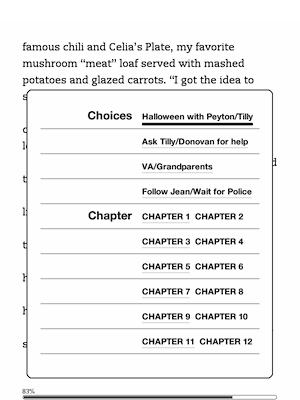Remember Choose Your Own Adventure books? They pioneered the idea of the book as a game, an interactive form of reading that let the reader control the direction of the story. You reached a decision point in the plot, the book presented options, and you turned to a different page depending on your choice.

A startup called Coliloquy launches today to bring that concept to the e-book market starting with four titles. They’re young adult romance novels, each written by an established author who took a bet with this new format. These teen fantasy stories will be a testing ground for whether interactive texts could be a new frontier for all kinds of publishers.
Pushing The Book Forward
E-books have not quite reached mainstream ubiquity, but this past holiday season was a big one for the e-ink Kindles that Coliloquy supports. Coliloquy’s timing is good, and its proposition is interesting. In the e-book era, a user-controlled storyline offers more than just deeper engagement. It provides feedback to the publishers and authors, so they can better tune the product to their customers.

Coliloquy enables episodic content unlike anything previously available on the Kindle. It’s more democratic. Authors can adjust their future offerings based on what they learn about their audience from the choices they make. It’s in-story analytics. And the readers get the satisfaction of influencing the outcome not just of one story but of a whole series.
A Writer and An Engineer
Coliloquy co-founder Lisa Rutherford says most of the other innovation around e-books is toward a more Web-like, multimedia experience. She’d rather stay focused on expanding the possibilities of text narrative. “What is a book?” she asks. “What goes on inside it?” She has a background as a writer, and her partner, Waynn Lue, is an engineer. They’re able to work with both the technical and narrative challenges posed by this idea.
Rutherford thinks “it’s a shame that, with the rise of digital fiction, innovation around the content has not kept up with innovations around the delivery.” Coliloquy will “take away all the constraints” on the notion of the book, she says, establishing “communication between the author and the readers.”
Active and Interactive
Coliloquy currently supports the Kindle Touch, basic Kindle and Kindle Keyboard models. It’s also testing on the Web, iOS and Android, including the Kindle Fire and Nook. Kindle development is slow going. Coliloquy is in the Kindle Developer Program for Active Content, and Amazon delayed its release several times, even though the company was ready.

It’s early days on this platform, but the potential is interesting, and Kindle is the right place for Coliloquy to be. These young adult romances are a good starting point, but the format could be expanded to all kinds of genres. Think about non-fiction. Imagine what long-form journalists or academics could do with this kind of feedback. Publishing articles could become a sort of Ask Me Anything thread. Here’s my report. What should I investigate next?
Coliloquy is a bold use of Kindle technology, but I’m more intrigued by its implications for storytelling itself. “This isn’t about replacing books,” Lue says. “It’s about expanding the canon.” That’s a noble objective. E-books free authors and readers from the constraints of the page, but they can also retain that comfortable format. Authors and readers who prefer linear text are not threatened by the e-book age. But for those who want to experiment, Coliloquy wants to make that possible.
You can learn more about Coliloquy and its current authors and titles, as well as the submission process for new authors, at coliloquy.com.

















